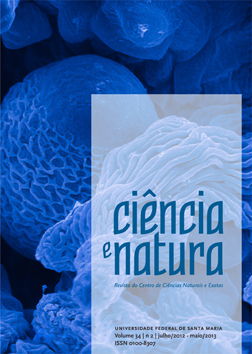Seleção de Isolados de trichoderma SPP. Na Promoção de Crescimento de Mudas do Feijoeiro CV. Carioca e Controle de sclerotinia sclerotiorum
DOI:
https://doi.org/10.5902/2179460X9341Palavras-chave:
mofo branco, Phaseolus vulgaris, controle biológico.Resumo
O objetivo deste trabalho foi selecionar isolados de Trichoderma spp. visando à sobrevivência de mudas de feijoeiro (Phaseolus vulgaris L.) cv. carioca na presença de Sclerotinia sclerotiorum (Lib.) De Bary, bem como a promoção de crescimento desse cultivo. No experimento ex vitro, visando à sobrevivência de plantas de feijão, foram utilizados quatro tratamentos (presença dos isolados IT2, IT3 e IT4 de Trichoderma viride + controle sem Trichoderma spp.) em substrato Plantmax® inoculado com S. sclerotiorum. O experimento da promoção do crescimento de plantas de feijão foi conduzido na ausência e presença de pó biológico da mistura dos três isolados de T. viride (IT2, IT3 e IT4) em substrato esterilizado e não esterilizado, totalizando quatro tratamentos. Nos dois estudos, os tratamentos foram dispostos em delineamento inteiramente casualizado com sete repetições e três plantas por repetição. Os isolados IT2, IT3 e IT4 promoveram as maiores porcentagens de sobrevivência das plantas de feijão ao mofo branco (84,56; 65,32; 96,87% e 73,50; 43,17; 96,87%; aos 21 e 35 dias, respectivamente), diferindo significativamente dos tratamentos controle (0 e 9,32%, respectivamente). A mistura dos três isolados de T. viride promoveu as maiores alturas das plantas, em substrato esterilizado e não esterilizado (23,69 e 20,42 cm, respectivamente), comparados aos tratamentos sem os isolados (13,78 e 16,375 cm, respectivamente). Na presença de pó-biológico, as médias de massa seca da parte aérea foram superiores (6,42 e 6,579 g) e diferiram do substrato esterilizado na ausência de pó-biológico (3,98 g). Conclui-se que os isolados testados de T.viride são eficientes no controle de S. sclerotiorum, apresentando maiores porcentagens de plantas de feijão sobreviventes. A mistura dos isolados também promove o crescimento de mudas de feijão cultivar carioca.
Downloads
Downloads
Publicado
Como Citar
Edição
Seção
Licença
Para acessar a DECLARAÇÃO DE ORIGINALIDADE E EXCLUSIVIDADE E CESSÃO DE DIREITOS AUTORAIS clique aqui.
Diretrizes Éticas para Publicação de Revistas
A revista Ciência e Natura está empenhada em garantir a ética na publicação e na qualidade dos artigos.
A conformidade com padrões de comportamento ético é, portanto, esperada de todas as partes envolvidas: Autores, Editores e Revisores.
Em particular,
Autores: Os Autores devem apresentar uma discussão objetiva sobre a importância do trabalho de pesquisa, bem como detalhes e referências suficientes para permitir que outros reproduzam as experiências. Declarações fraudulentas ou intencionalmente incorretas constituem comportamento antiético e são inaceitáveis. Artigos de Revisão também devem ser objetivos, abrangentes e relatos precisos do estado da arte. Os Autores devem assegurar que seu trabalho é uma obra totalmente original, e se o trabalho e / ou palavras de outros têm sido utilizadas, isso tem sido devidamente reconhecido. O plágio em todas as suas formas constitui um comportamento publicitário não ético e é inaceitável. Submeter o mesmo manuscrito a mais de um jornal simultaneamente constitui um comportamento publicitário não ético e é inaceitável. Os Autores não devem submeter artigos que descrevam essencialmente a mesma pesquisa a mais de uma revista. O Autor correspondente deve garantir que haja um consenso total de todos os Co-autores na aprovação da versão final do artigo e sua submissão para publicação.
Editores: Os Editores devem avaliar manuscritos exclusivamente com base no seu mérito acadêmico. Um Editor não deve usar informações não publicadas na própria pesquisa do Editor sem o consentimento expresso por escrito do Autor. Os Editores devem tomar medidas de resposta razoável quando tiverem sido apresentadas queixas éticas relativas a um manuscrito submetido ou publicado.
Revisores: Todos os manuscritos recebidos para revisão devem ser tratados como documentos confidenciais. As informações ou ideias privilegiadas obtidas através da análise por pares devem ser mantidas confidenciais e não utilizadas para vantagens pessoais. As revisões devem ser conduzidas objetivamente e as observações devem ser formuladas claramente com argumentos de apoio, de modo que os Autores possam usá-los para melhorar o artigo. Qualquer Revisor selecionado que se sinta desqualificado para rever a pesquisa relatada em um manuscrito ou sabe que sua rápida revisão será impossível deve notificar o Editor e desculpar-se do processo de revisão. Os Revisores não devem considerar manuscritos nos quais tenham conflitos de interesse resultantes de relacionamentos ou conexões competitivas, colaborativas ou outras conexões com qualquer dos autores, empresas ou instituições conectadas aos documentos.






